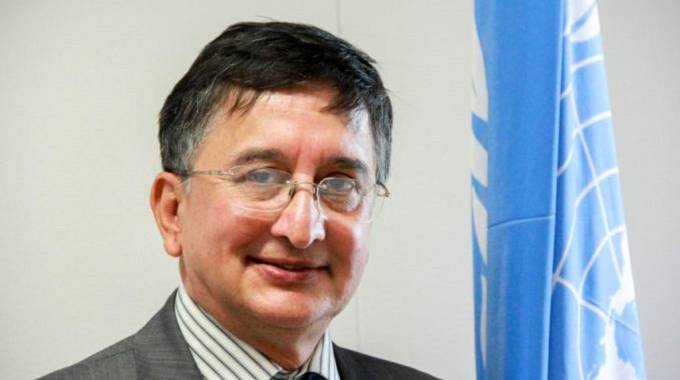Co-op rekindles hope for distressed villagers

Walter Mswazie, Features Correspondent
MRS Tabitha Nhuna (63) of Ratisai Village in Ward 17, Masvingo Central is a widow living with her six orphaned grand children.
She has a three-hectare field on which she grows maize, groundnuts and sorghum but hardly produces a tonne at each harvest time.
However, Mrs Nhuna said she had a meaningful yield during the 2016/17 farming season where she harvested three tonnes of maize, half a tonne of sorghum and another tonne of groundnuts, as the province received good rainfall.
The season saw the province receiving an average of 200mm of rain.
From 2017, she said, she has not been able to harvest any meaningful yield and in the current season, the crops succumbed to moisture stress and are a complete write off.
Mrs Nhuna said she no longer entertains any hopes of harvesting anything from the heavily leached field but was quick to hail drought mitigating measures that she and other community members are involved in.
She and 48 other families are now engaged in aquaculture (fish farming) and, apiculture (bee keeping) projects, courtesy of Aquaculture Zimbabwe, from which they are realising some nutrition as they harvest fish for family consumption as well as for the market.
The villagers who have formed a co-operative, Chebvute Co-operative, are also into poultry farming and horticulture.
Through United Nations agencies support, the villagers have also constructed a weir along the Chebvute River.
A recent tour of Chebvute Co-operative led by UN Resident Co-ordinator Mr Bishow Parajuli revealed that water harvesting, fish farming, bee keeping, poultry and thriving horticulture projects had rekindled lost pride to the distressed villagers of the drought-prone district of Masvingo.
The villagers have now found effective ways to fight climate change–induced shocks.
The weir dam provides water for the 20×50 metres fish pond with 10 000 fingerlings having been stocked. The water is also used to irrigate a two-hectare horticulture plot downstream as well as provide clean tap water.
The co-operative members have also installed a solar water pump which draws water from the weir dam into a 10 000 litre tank where it is purified before being taken to taps for use by the villagers, most of whom are not part of the project.
Behind the water source lies another garden on which they grow vegetables and rear 200 chickens. The poultry project also supports horticulture as chicken droppings are used to boost soil fertility.
“We have found a game changer. Our livelihoods have drastically been transformed as I am now able to fend for my grandchildren,” said Mrs Nhuna.
“Although we continue to get maize grain from government, we are no longer underprivileged.
“All my grandchildren are below the age of 18 and attend Rupike Primary and Mapakomhere High School respectively. I sponsor their education, save for three whose school fees is paid by paternal relatives,” she said.
Mrs Nhuna said the villagers were now able to mitigate the effects of climate change and thus the looming El Nino-induced drought will not be felt.
Vice chairman of the co-operative, Mr Pardon Madyiwa, said they had already installed an apiary of 42 beehives around the project site and were looking forward to a bumper harvest of honey.
He said they were hoping to harvest at least 25kg of honey from each hive which they would sell to both individuals and shops in Masvingo city. “We look forward to harvesting at least 25kg of honey from each hive. We normally sell a 250g bottle of honey for $3.
“However, since we started in 2017, we have never sold on a large commercial scale as anticipated.
“We had a challenge of securing wax to start the project but we have since been assured of adequate wax by some partners,” said Mr Madyiwa.
He said the co-operative anticipates to establish a formal apiary and honey processing centre as part of buttressing the value addition chain. “We look forward to having a bee-keeping industry where we have an apiary and a honey processing centre where we will also be able to supply chain shops. The market is readily available in Masvingo city and shops dotted around the province,” Mr Madyiwa said.
According to research, Zimbabwe has the potential to produce 500 000 litres of honey per year. At the moment, the country produces at least 70 000 litres of pure honey per year from about 16 000 bee farmers across the country. It is also believed the country has the potential to produce several tonnes of bee wax per year.
Bee wax is used as a skin moisturising agent, candle manufacturing and cooking among others uses.
Mr Parajuli hailed villagers for being able to combat drought through embracing resilient and mitigating strategies for farming.
“With the looming El Nino-induced drought, there is a need to capacitate communities to be able to provide for their families even when there is no meaningful harvest from their fields and 70 families here are doing exactly that,” said Mr Parajuli.
He said it is refreshing to note that there is provision of clean tap water for mothers and children.
“It has also come to my attention that you are now capable of sending children to school using proceeds from your agricultural activities. I appeal to you to remain peaceful in your homes as violence disturbs the lives of children and retards development.”
World Food Programme (WFP) representative, Mr Eddie Rowe, hailed community participation in planning drought resilient mechanisms that Chebvute Co-operative members had.
“With the participation of 48 villages, the communities in Chebvute prioritised the construction of a weir dam. This has enabled them to harvest different crops, vegetables, raise poultry, cattle and goats and establish fish ponds with 10 000 fingerlings amidst a ravaging drought in the area,” he said.
Mr Rowe said the community asset building programme had demonstrated that communities can break the vicious cycle of poverty induced by recurrent droughts.
Aquaculture Zimbabwe country director Mr Martin Dingwa said they had trained at least 8 000 families across Masvingo on fish farming and bee keeping and it was refreshing to note that many livelihoods had since been transformed as a result.
“Since we came to Masvingo in 2012, we have managed to train 8 000 families across all seven districts in Masvingo province.
“We have trained families in Masvingo rural where we are today, Chivi where we have launched an integrated programme; Bikita, Zaka, Gutu, Mwenezi and Chiredzi,” said Mr Dingwa.
He said all the beneficiaries were still into fish farming including those communities which were no longer receiving assistance from the organisation.
“I am happy to announce that all the communities we have trained are still active. We are no longer offering any support apart from information on how to maintain the projects. Most of them are now operating on a commercial scale and using proceeds from these projects, they have connected electricity to their homesteads,” said Mr Dingwa.
–@walterbmswazie2










Comments